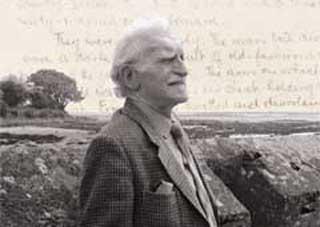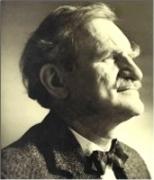Flying the Flag for Literature

For over forty years the Northern Irish writer Sam Hanna Bell bravely tried to use Ulster’s history and culture as a means of bringing it’s people together, as this selection of his superior non-fiction shows. By Edward O’Hare
A banderol is a long thin flag flown from the masthead of a ship or carried at the head of a procession. For Sam Hanna Bell it was a fitting symbol for the artist, a flowing band of colour to be held aloft, leading the way into the future. Today it can also be seen as a metaphor for Hanna Bell’s long career, since he was consistently at the forefront of Northern Ireland’s cultural life. A man of letters in the fullest sense, it was as a radio features producer for the BBC that Hanna Bell made his most important contribution to the lives of the citizens of his beloved Ulster. A Salute from the Banderol, a comprehensive selection of Hanna Bell's non-fiction, has now been edited by his son Fergus and published to mark the centenary of his birth.
Sam Hanna Bell was in fact born in Glasgow. When he was eight his father died and he, along with his mother and brothers, moved to a farm near Strangford Lough in County Down. Hanna Bell’s early experiences of life in an agricultural community never left him but his family’s poverty meant that he only received a basic education. Instead he took whatever work he could get, indulging his love of literature and his passion for politics in his spare time. These interests led him into journalism and subsequently to the BBC, for whom he went on to make 600 radio programmes over 20 years.
It is hard to understand what an important role BBC radio played in the age before television. Hanna Bell entered the Northern Features Department under the guidance of the poet Louis MacNeice in 1945, but soon established a voice of his own. Although a Presbyterian, Hanna Bell immediately began to challenge the anti-Catholic ethos of Belfast’s Broadcasting House. He was intensely aware that radio had the potential to consolidate a community’s unique sense of its own cultural identity and from the outset endeavoured to use literature, music, art and sport to overcome sectarian division. He would pursue this goal for the rest of his life.
Hanna Bell’s work for radio is represented by three pieces in A Salute from the Banderol. The first, The Microphone in the Countryside, concerns the struggle of a radio documentary producer not just to record “the history, character and day to day life” of a rural community and “galvanise into life dim, half-forgotten events,” but to capture something different “that no-one else has found.” The second, This is Northern Ireland, was Hanna Bell’s most famous radio programme. A monumental portrait of Ulster taking in everything from the shipyards of Queen’s Island to the spires of Armagh to the Mourne Mountains, it is an unsentimental assessment of its past, present and future. With superb agility Hanna Bell’s script blends the rites of Bronze Age worshippers, the origins of the trades peculiar to different regions, the testimonies of farmers, fishermen, storytellers, musicians and poets and the memories and aspirations of ordinary people. It remains a huge achievement. The final radio piece is West of Derry, East of Eden, a fascinating programme looking at how John Steinbeck reimagined the lives of his mother’s Northern Irish emigrant ancestors for his novel East of Eden.

